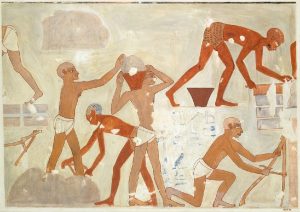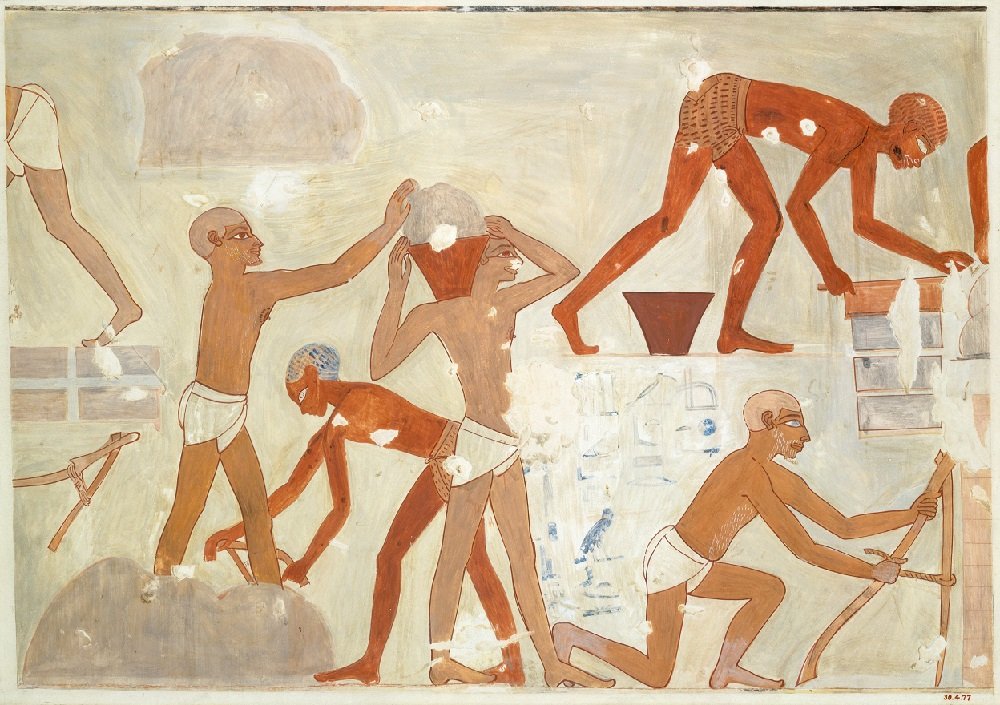This is an archive of prayers, songs, and other individual works relevant to the fifth course of the seder for Pesaḥ (Passover): Magid, the core of the Haggadah containing its midrash aggadah. Click here to contribute a work or a transcription and translation of a historical work that you have prepared for Magid in the Seder Pesaḥ. Filter resources by Collaborator Name Filter resources by Tag Filter resources by Category Filter resources by Language Filter resources by Date Range
This letter, written in Imperial Aramaic in 419 BCE, is among the vast number of papyrus letters found in Elephantine, also known as Yeb. The Jewish (or more accurately, Judean) community of Yeb is a fascinating bit of history — a group of Judean mercenaries who settled in Egypt and built their own smaller temple! Although their origin was clearly Judean, and they referred to themselves as the ḥeila yehudaya = Judean garrison, their form of worship featured no Deuteronomic centralization, no discussion of the patriarchs, and questionable monotheism! Although the primary deity was YHW (note the difference in spelling), multiple other deities or hypostatized aspects of divinity were worshipped, and verbs for the word “God” are conjugated in the plural rather than the singular. This text is one of a series of letters written between the brothers Yedaniah and Ḥananiah. In this case, it is giving instructions for keeping the holiday of Pesaḥ. These instructions are interesting in their own right — the prohibition on beer could alternatively be read as a prohibition on any alcoholic drink, which would align with Karaite practice rather than rabbinic. But what’s even more interesting is what isn’t mentioned — the instructions given mention nothing whatsoever about the exodus from Egypt, or even God! The diktat to observe the holiday is accredited not to God or Moses, but to Darius, king of the Achaemenid Empire! This passage is a fascinating taste of a part of Judaism that we know very little about. Vocalization according to Tiberian norms and translation into English by the translator. . . . Categories: Tags: Contributor(s): Itti Bishlam is a sixteen-hundred year old Samaritan Aramaic poem attributed to the great Samaritan sage Marqeh son of Amram. In twelve stanzas it tells the story of the night of the tenth plague and the Exodus. Samaritans traditionally recite it on the night before the holidays, the Sabbaths before the holidays, and the evening before the first day of the first month (the Samaritan new year, fourteen days before Passover). Largely a half-alphabetical acrostic, the fifth stanza of Itti Bishlam begins with an īt (ḥeth) rather than the expected īy (her), understandable considering the loss of guttural distinctions in Samaritan phonology. (See the number of Jewish poems which confuse sin and samekh for a parallel occurrence.) Itti Bishlam is, interestingly enough, lacking polemic or sectarian content — it never calls upon the Samaritan holy mountain of Aargaarizem (Mt. Gerizim), nor does it include any context that contradicts the traditional Jewish interpretation of the paschal narrative. It is worthwhile for Jews to learn about and understand the liturgical practices of their sister religion, and this poem is a great place to start! . . . Categories: Tags: 41st century A.M., 4th century C.E., Aramaic, Defter, Israelite-Samaritan, Late Antiquity, Marqeh son of Amram, פיוטים piyyuṭim, Samaria, Samaritan, Nusaḥ haSamerim Contributor(s): The piyyut, Dayenu, in its Latin translation by Johann Stephan Rittangel. . . . Categories: Tags: Contributor(s): This is Ha Laḥma Anya in Aramaic with translations in Ladino and English, from the Passover Seder Haggadah of Rabbi Emily Aviva Kapor-Mater, Haggadah Shir Geulah (2015, v.2.1/2016). . . . Categories: Tags: Contributor(s): Emunim ʿIrkhu Shevaḥ is a brief piyyut recited in North African communities in Rabban Gamliel’s list, between Pesaḥ and Maror. It spells out “Aaron the Priest” as an alphabetical acrostic, but it is uncertain whether this is an authorial signature or a mystical reference to the Biblical figure. . . . Categories: Tags: Contributor(s): In many Eastern rites, as well as in the writings of R. Avraham ben haRambam, it is customary to add this brief midrash to Dayenu, after the verse that ends “but had not given us their wealth, dayenu.” Here it is translated into English, including some notes for certain locations where the Yemenite nusaḥ differs from others. . . . Categories: Tags: Contributor(s): In many eastern communities, including the communities of Aleppo and Yemen as well as the haggadah of Ḥakham Ovadia Yosef, this text is added to the extrapolation of the First Fruits declaration found in the Pesaḥ Maggid. Specifically, it is found after the citation of Exodus 12:12, specifically within or after the passage concluding “…who is Me and there is no other.” . . . Categories: Tags: Contributor(s): The ancient Jewish community of Djerba, an island off the coast of southern Tunisia, has many unique customs and practices. Among them is that during the Maggid, after the citation of Joshua 24:2-4 and before the paragraph beginning “Praise the One who keep faith with the people Israel,” an extensive work in Judeo-Tunisian Arabic is recited, telling the well-known story of Abraham’s realization of divine unity and his ordeal in the oven of fire. Here is a transcript of that text, vocalized according to the original manuscripts, transcribed, and translated into English and modern Hebrew. . . . Categories: Tags: Contributor(s): Rav Saadia Gaon lists three additions to the Seder Pesaḥ which he considers not necessary, but acceptable. This is the third, a poetic insert of the blessing of redemption known as Ata Ga’alta. In the form of an alphabetical acrostic, this poem is still recited in many eastern communities including the Babylonians, Persians, and Yemenites, and was a feature of the the old Kaifeng rite. Here it is recorded and translated into English according to the nusaḥ of Saadia Gaon, with notes in several locations for additional phrases used in some customs. . . . Categories: Tags: Contributor(s): A millennium-old tradition, recorded by Rav Sherira Gaon in 10th-century Iraq. He would always have three cooked foods on the seder plate. The egg, a product of the birds of the sky, a sign of renewal and rebirth, represented Moses, the law, the heavens, and the revelational aspects of faith. The shankbone, a product of the animals of the field, a commemoration of the original Pesaḥ sacrifice, represented Aaron, the priesthood, the earth, and the ritual aspects of faith. And the fish, representing the constant flowing nature of water, represented Miriam, prophecy, the waters, and the spiritual aspects of faith. . . . Categories: Tags: Contributor(s): A series of ten short couplets describing the ten plagues afflicting the Egyptians in Egypt, written in Judeo-Italian and first published in the famous 1609 Venice Haggadah of Isaac Gershon. The Italian used in the Venice Haggadah lacks a lot of the most divergent aspects of the Judeo-Italian languages, sticking to a more mainline Tuscan grammatical norm, but there are enough obsolete, poetic, or dialectal forms that several footnotes have been included to explain them. Also included is an original English-language rhyming translation! . . . Categories: Tags: Contributor(s): In Yemenite practice, directly after the four questions are recited the youngest literate person at the table reads a brief Judeo-Arabic passage, here transcribed per the Yemenite transliteration system (wherein gimel dagesh = j and qof = g) and translated into Arabic and Hebrew. Instructional notes say this passage is “for the benefit of women and toddlers,” the two main classes of people who would have not had access to Hebrew education at the time. . . . Categories: Tags: Contributor(s): We are hereby ready to fulfill our obligation of K’vod Habriot, respect for the dignity of every human being. We pray that our fellow citizens shall not be the source of suffering in others. We commit ourselves to raise our voices in support of universal human rights, to know the heart of the stranger, and to feel compassion for those whose humanity is denied. May our compassion lead us to fight for justice. Blessed is the Source of Life, who redeemed our ancestors from Egypt and brought us together this night of Passover to tell the story of freedom. May God bring us security and peace, enabling us to celebrate together year after year. Praised are you, Source of Righteousness, who redeems the world and loves justice and freedom. . . . Categories: Tags: Contributor(s): Traditionally each cup in the Passover Seder is liked to a promise made by God in these verses, Exodus 6:6-7. The four cups can also be associated with the Four Freedoms first articulated by US President Franklin D. Roosevelt on January 6, 1941, which were an inspiration for the Universal Declaration of Human Rights and were explicitly incorporated into its preamble. . . . Categories: Tags: Contributor(s): A meditation which can be used to prepare for Pesaḥ, or for sharing at the Seder, to deepen the experience of liberation for yourself and others. . . . Categories: Tags: Contributor(s): A Passover supplement created for recitation at Passover seders in the context of the COVID-19 coronavirus pandemic. . . . Categories: Tags: Contributor(s): Modeled after Gil Scott Heron’s “The Revolution Will Not be Televised,” written for Passover during the pandemic (April 2020). . . . Categories: Tags: Contributor(s): A prayer for the Passover seder recognizing the enslavement and estrangement of Jews and Israelites of African descent with hope for their ingathering. . . . Categories: Tags: Contributor(s): A playful, powerful, passionate reading for Passover seder or any time. Can be chanted to the traditional Ashkenazi lilt for the Four Questions. . . . Categories: Tags: Contributor(s): According to Mishnah Pesaḥim 10:4, “One expounds (doresh) from ‘A wandering Aramean was my father’ (Deuteronomy 26:5) until he finishes the whole story.” This supplement to Maggid, the verse Deuteronomy 26:9 and its midrash, fulfills the obligation. The verse and its midrash fit into the Passover Haggadah after the ten plagues and the midrash on them, right before the song Dayyenu. . . . Categories: Tags: Contributor(s): |



